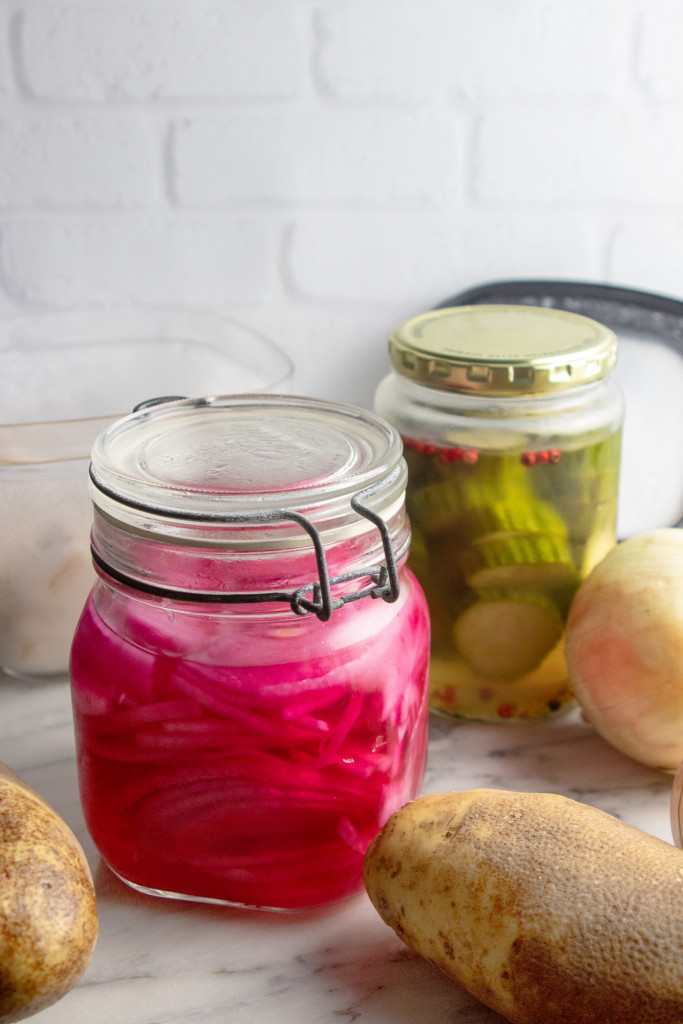Don't worry if you didn't stock up on dry goods - we've got the scoop on how to make everything last.
It's no surprise that right now, the pantry items have been the #1 priority: rice, beans, grains and canned vegetables have been some of the first grocery store items to sell out. If you were late to the game, don't worry (especially because there's no shortage of food - it will all get restocked!). There are a lot of grocery store items that are getting looked over, but are still great, nutritious and tasty contenders for your social distancing! Many food items, especially produce, have been left untouched at the markets - but don't leave them hanging, because we can make those shelf lives stretch. No previous knowledge of preserving or canning required - these can almost all be done without any special equipment of any kind.
Let's break it down!
Potatoes
People might not immediately think of potatoes as a pantry item - after all, if you let them sit on the counter for more than a week, they can start to sprout some funky stuff. However, potatoes can last a loooong time in the fridge! We're talking at least a month, and you can make such a wide variety of food out of potatoes. Yes - this includes sweet potatoes, too! It's one of the most versatile types of produce out there - roast them, mash them, twice bake them... the options are almost endless.
Russet potatoes have the longest shelf life, and smaller waxy potatoes like yukon gold, red and fingerling won't last quite as long as them.
Onions
Onions are another vegetable that seem to be getting a bit overlooked at the grocery store. Whole raw onions, like potatoes, can last at least a month in the fridge - and oftentimes longer. It all depends on how long they were already sitting on the shelf before you bought them, so try and look for the freshest ones. You can tell which onions are the most fresh with a few tactics: make sure they're firm with no soft or mushy spots. If there's any sign of wetness, they could be starting to go bad. Overall, look for the onions that look the least "beat-up" - the ones with the tightest and most intact skins are a good sign that they're fresh, too.
Additionally, onions are a great contender for pickling - especially red onions! Here's the quick-pickling method:
•First, slice them up and put them in a jar.
•Then, in a medium pot on the stove, add half a cup of vinegar - we love apple cider vinegar, but white wine vinegar or rice vinegar will work great too!
•To the pot, add 1 tablespoon of sugar, and a teaspoon and a half of salt. Add about half a cup of water, and start bringing to a boil. Before it boils completely, when the sugar is dissolved, go ahead and taste it - you can adjust the salt and sugar to your liking!
•Once boiling, carefully pour the hot brine over the onions, and allow to cool. Once it's at room temperature, you can close it up and store in the fridge for about a month. It's a great way to add brightness and zingy flavor to any dish - salads, sandwiches, tacos, and even avocado toast!
Turnips, Carrots, Parsnips, Beets, & other root vegetables
Root vegetables like these have a surprisingly long shelf life when refrigerated! Raw and as-purchased, they can generally last about 3-4 weeks in the fridge. If you want to extend their lives even longer, you can freeze them with ease. Simply cut any of them up into 1" - 2" pieces, and boil them in water for a few minutes. Shock them in a bowl of ice to stop the cooking process - and once drained, you can bag them up and freeze. They'll keep for a year!
This method is great for roasting and mashing. The best way to defrost them is to take them out of the freezer and into the fridge about a day before you want to use them - then, you can go ahead and throw them in the oven to roast up and get golden brown and delicious, or mash them!
Winter Squash like Butternut Squash, Spaghetti Squash, Acorn, Kabocha, etc...
These are very hearty foods that will last a long time! When they're raw and haven't been cut into, they can last up to a 3 months just sitting on the counter top. While that's already a seriously great shelf life, you can further extend how long they'll last by following the same freezing method for root vegetables mentioned above. You can then roast, mash, puree into soup... whatever you'd like!
Green Beans, Cucumbers, Cauliflower, Fennel, Peaches, Rhubarb, Okra, Asparagus, Bell Peppers, Radishes...
You can pickle that! You can use our aforementioned method for pickling just about anything to extend the shelf life. Epicurious also has a great guide on how to pickle pretty much anything - find it here!
Ground Beef, Turkey or Chicken
Our suggestion? Make meatballs! If you have fresh ground meat on hand, you can whip up meatballs with ease. For every pound of meat, add 1 egg and about half of a cup of breadcrumbs (if you are out of breadcrumbs, blitz some crackers in the food processor - it'll do the trick!). Add your favorite seasonings, and some grated Parmesan cheese or Pecorino if you have it. Test out the flavor by searing off a small piece on a pan - once it tastes how you like it, you can bake the meatballs on a sheet tray. The amount of time to cook them will depend on how large your meatballs are, but we generally go for about 20 minutes at 400 degrees - just make sure you check that they're fully cooked! Once they're at room temperature, you can freeze them for easy future meals.
To reheat the meatballs, either turn to the microwave, or slowly simmer them in marinara sauce.
If you don't have the supplies to make meatballs, you can simply form them into patties and freeze for a quick burger. Even simpler, just flatten the ground meat in a freezer bag, and wrap in aluminum foil to prevent freezer burn. Defrost for a day by setting it in the fridge, and then you can make whatever you'd like with the defrosted meat.
Fresh Herbs
There are quite a a few methods to make those beautiful fresh herbs last more than a couple of days! The simplest method that we believe is the most convenient for quick-use is to turn them into dried herbs. You can do this in the oven at a super low temperature - 180 degrees F or less - and let it go for 2-4 hours. You can check on them periodically, and if they're crumbly to the touch, they're ready to go. Once they're cooled and put into containers, they can last for months - even years!
We also have a super expedited method - do it in the microwave!
You can also freeze your herbs. Do this by spreading the cleaned herbs out on a plate or sheet tray in the freezer until frozen - then, put them into labeled containers or freezer bags. They usually last 1-2 months this way!
Bananas, berries, mangos, pineapple and melon
This one may be obvious, but nonetheless important: freeze them! So often, fruit can quickly go moldy before we realize. Get ahead of the game and freeze them yourself! Dice everything up into small blender-friendly pieces, and they can go straight to the freezer bag or tupperware.
If you worry about the fruit pieces clumping and freezing together, you can first freeze them on a plate or sheet tray so that none of the pieces are touching. Once frozen, transfer to the bag or tupperware - nothing will stick together this way!
Apples
Apples love the cold. Stick them in the fridge! They can last at least a month in the fridge (don't let the temperature get too cold or they might start getting wrinkly) and up to 2 months before the quality starts degrading.

















0 comments